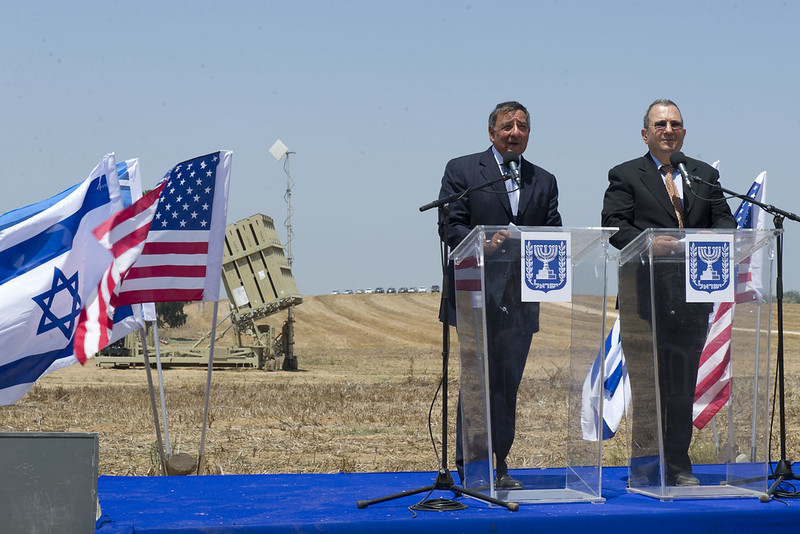
Ehud Barak had what likely was his last meeting yesterday as defense minister with Leon Panetta. (Barak announced his retirement this week and Panetta is also expected to quit soon.)
The press conference at the Pentagon was supposed to be a mutual admiration society event, and to a degree it was — Panetta presented Barak, who is widely admired on the Potomac, with the Pentagon’s highest civilian honor, the Distinguished Public Servant Award.
But there were unexpected notes of dissent on Iran and Syria policy.
[[READMORE]]
Barak seemed genuinely moved by the award. He pinned it to his jacket, began speaking and then paused, to admire it again.
Panetta also presented Barak with a framed version of the photo above, inscribed as follows:
To my friend Ehud
With deepest thanks and appreciation for your friendship and leadership in building a strong military to military relationship between the United States and Israel — working together, we have kept our countries safe and our people secure. Regards, Leon Panetta.
Barak, in turn, gave Panetta a little desk model of an Iron Dome anti-missile missile, and seemed a little embarrassed, given the exchange imbalance:
It’s a small Iron Dome. It doesn’t explode. It cannot shoot — so don’t worry. But just to give you a small memento, our appreciation.
In the Q and A that followed, however, Barak could not resist pushing back against Panetta’s suggestion that Israel and the United States are on the same page regarding the effectiveness of Iran sanctions. And then, hewing to his "Middle East is a bad neighborhood" narrative, he also suggested that Western (i.e. U.S.) policy on Syria was overly cautious.
Here’s how I reported it in a story we just posted:
Panetta said he and Barak had discussed Iran and suggested that Barak agreed with the U.S. assessment that "there is time and space for an effort to try to achieve a diplomatic solution."
Such a solution, Panetta continued, "remains, I believe, the preferred outcome for both the United States and for Israel," Panetta said. "After all, Minister Barak is a battle-hardened warrior. And like so many great military leaders, he is fundamentally a man of peace, because he’s seen war firsthand. He recognizes that we must take every possible step to try to avoid war."
Barak did not address Iran in his prepared remarks, but, pressed by reporters, implied skepticism of the Obama administration’s diplomatic gambits.
"Sanctions are working, and they’re more helping than anything I remember in the past, vis-a-vis Iran," Barak said. "But I don’t believe that this kind of sanctions will bring the ayatollahs into a moment of truth, where they sit around the table and look at each other’s eyes and decide that the game is over, they cannot stand it anymore, they’re going to give up their nuclear intention. I don’t see it happening."
Instead, Barak said, Iran would have to be "coerced" into ending the program, which he predicted would happen in 2013.
Barak also offered an implied critique of how the Obama administration was handling the civil war in Syria and the Assad regime’s brutal response.
"It’s criminal behavior on a global scale, what he’s doing to his own people, using jet fighters and helicopters and artillery and tanks, killing his own people," Barak said. "The whole world is watching. And somehow, it’s not easy to mobilize enough sense of purpose and unity of action and political will to translate the — our feelings about what happens there into action to stop it. And that’s one of the lessons I have took from the last few years in the Middle East."
I don’t think Barak was getting in digs — I’ve covered him for 20 years and he’s not the type. But he does tend to think aloud.
And these thoughts suggest that tensions between the Netanyahu and Obama governements on threat assessments, while at bay for now, persist.
Here’s the whole transcript.
JTA has documented Jewish history in real-time for over a century. Keep our journalism strong by joining us in supporting independent, award-winning reporting.





